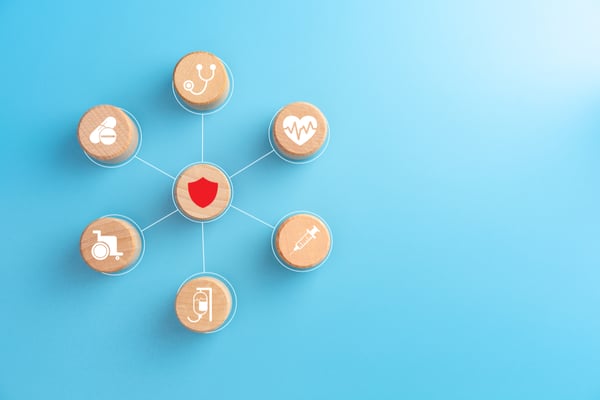Global B2B healthcare is expected to have a revenue of over $526 billion by 2025. This industry is growing rapidly, with B2B healthcare businesses eager to secure their market share. One of the best ways to achieve this follows on a major industry trend: digital transformation. Here’s how digital marketing can set your B2B apart from the rest.
Whether you sell software that supports medical technologies, medical equipment or the likes of testing kits, B2B healthcare marketing is applicable to your business. In fact, 5% of all searches on Google are healthcare related. The other trigger to cause this shist is the COVID-19 worldwide pandemic. This has resulted in a surge in demand for healthcare supplies, however it has also altered the way this marketing is done. During pre-pandemic days, healthcare B2Bs have had to rely on trade shows and sales events to effectively market their products and services. That’s changed. Here’s how to take your marketing to the digital sphere…
First things first, you need to know that digital marketing requires a concerted effort that is of a high quality, is consistent and much like the B2B industry itself, implemented with long term growth and sales in mind. The majority of medical buyers research and compare products and offers online before reaching out. As healthcare B2Bs adjust to digital marketing, there are new market entrants who are technologically savvy winning market share.

Challenges of B2B Healthcare Marketing
- Industry pressures: Healthcare is an essential service and one which is often home to high pressure environments. This can slow down the processes of marketing and adaptability among practitioners, hospitals and clinics. While B2B sales are known to have long turn around times, that time period is even longer for B2B healthcare purchases. Medical investments are significant in terms of cost, so these generally do not occur often. In addition to this, there are several approval stages which need to be passed before purchases are made.
- Regulations: Healthcare businesses have hefty regulations within the industry that need to be adhered to. In addition to this, there are regional compliance measures in place that are specific to various businesses, which can affect the way you market your product or service. Review processes for these can be lengthy, which needs to be factored into your marketing strategies, along with an in-depth understanding of which regulations will impact your marketing activities.
- Audiences: Reaching your target audience will require hyper focused audience segmentation. It is important that your business reaches other businesses in healthcare, not the end consumer, as is often the case. In order to achieve this, your personas need to be well developed in order to gain traction in front of the right audience.
Digital marketing for B2B healthcare
- Knowledge: Marketers need to be familiar with medical information and jargon in order to fully understand the product and how best to sell it.
- Timing: Digital marketing that is successful is not something that is achieved instantaneity. Rather, it needs to be consistently implemented over time.
- Metrics: With all digital marketing, there are robust analytical insights available to marketers. These metrics can be critical to your marketing strategy when it comes to buy-ins and approvals.
- Optimisation: Your website and content needs to be optimised in order to be recognised and recommended by search engines. Since healthcare is frequently searched for online, you’ll need to conduct thorough keyword analysis. This will not only boost your visibility and relevancy but also support your content.
- Advertising: Boost your business digitally with search engine marketing and paid advertising on social media where it matters most. For healthcare B2Bs, that’s LinkedIn, the platform where over 80% of social leads are generated.
- Sales: Your sales teams need to be working with your marketing teams closely in order to crossfeed relevant information. This will be highly beneficial in generating and nurturing leads.
- Website: You need a website that reflects your brand and its capabilities. Design it in a way that is inviting, informative, adaptive and able to be personified with chatbots and UX design. We recommend using HubSpot as your CRM platform.
- Personalisation: All marketers are working towards becoming more personal in their communication and approaches. This is especially true when it comes to healthcare, considering the time spent moving along the sales funnel is so lengthy, these connections can be a determining factor for your leads.
- Quality content: When developing content, it is essential to ensure that it is intentionally developed. It is a way to build trust, show expertise and address topics that are important to your audience.
- Video: Videos rank higher as organic content in comparison to text. You can use video for demonstrations, webinars (with expert panels), testimonials and whiteboards. These can spark creativity, comparisons, interest and contact among viewers.
It is clear to see that digital marketing is - and will continue to be - a key factor for healthcare B2Bs. Managing the challenges and developing best practice strategies as mentioned in this article will be essential in getting your business’s offering seen by the appropriate medical buyers and if successfully implemented, acquiring leads.
Don’t get left behind.
Speak with us at Nexa. We're here to deliver a digital marketing strategy for your healthcare B2B.
%20(1).png?width=2701&height=607&name=BRC_NEXA_LOGO_WHITE%20(2)%20(1).png)
